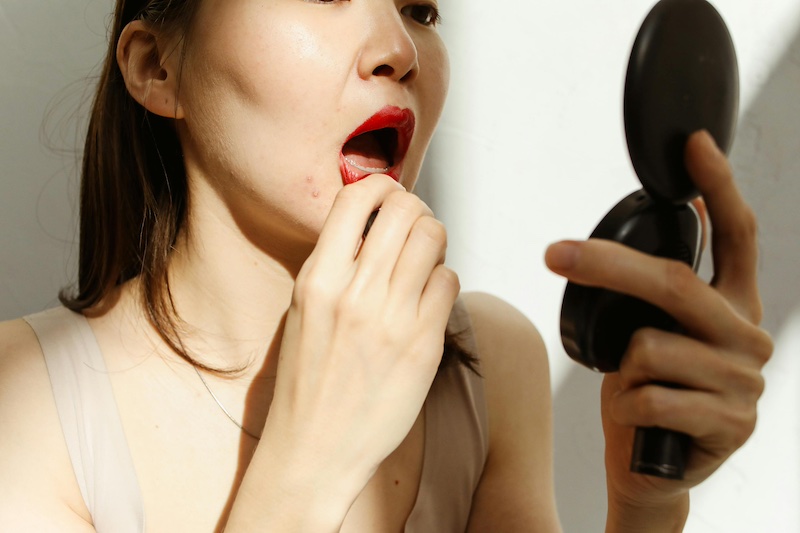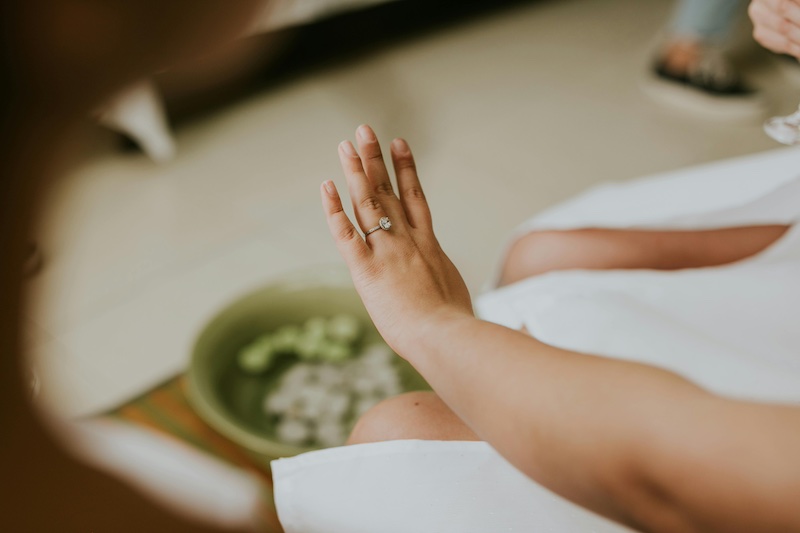10 Things You Should Never Do While Wearing Your Engagement Ring
When to take off your bling.

When to take off your bling.

If you’re newly engaged, you probably can’t stop gazing dreamily down at your suddenly sparkly left hand. And rightfully so. Chances are your engagement ring is one of your most valuable possessions (after, you know, the love it represents).
But, while your love for your partner might be eternal, your engagement ring won’t be unless you take some precautions.
To keep your prized possession in mint condition, you’ll want to do everything you can to protect it–which also means recognizing when to take off your engagement ring and store it in a safe place.
Let’s dive into ten scenarios in which it’s best not to flaunt your ring, plus consider how renters insurance could protect it.
You should always take off your ring before getting in any body of water—whether you’re taking a relaxing bubble bath or an open water swim.
Showers and baths risk exposing your bling to some potentially dangerous products (more on that in a bit) while the chlorine in pools and saltwater in oceans can lead to wear and tear. Studies on chlorine and fine jewelry have, for instance, shown how chlorine can stress karat-gold settings and cause cracks and breakage–especially in high-temperature conditions like hot tubs.
Aquatic activities can also be risky because water makes it much easier for your engagement ring to slip right off your finger and get lost. Imagine the sheer panic of stepping out of a draining tub after a relaxing soak only to realize that your left hand is bare and your ring floating somewhere in your city’s wastewater system.
It is okay to keep your ring on when washing your hands–just avoid scented hand soaps or hand soaps with abrasive ingredients.

Whether you’re a full-fledged gym rat or just enjoy the occasional hot yoga, sweaty activities aren’t necessarily the best for your engagement ring.
Exercise creates a lot of friction that could scratch, chip, or loosen the stones in your ring. Plus, sweat itself isn’t good for your metal band and could potentially tarnish it.
Make sure to leave your engagement ring in a safe place at home before heading out to any athletic endeavor. (Even leaving it in the locker room could run the risk of loss or theft.)
And, if the idea of sporting a bare fourth finger at your adult volleyball game is simply unbearable, consider swapping out your ring for a temporary dupe, like one of these nifty silicone options.
Household cleaners like bleach, baking soda, and ammonia-based products like Windex can dull precious metals and even cause them to crack. Wearing rubber gloves helps, but still beware of rubbing your ring too vigorously against anything you’re cleaning or scrubbing.
You should also take your ring off when washing dishes–especially if you’re handling pots and pans. To err on the safe side, take it off before starting even the most casual of cleans.
Even if you keep up with regular at-home and professional ring cleaning, your ring still holds dirt and dangerous bacteria that could transfer to your food. And handling foods, like raw meat, could in turn transfer bad bacteria back to your ring.
Plus, cooking exposes your ring to extreme temperatures, abrasive substances, and potential physical impacts that can weaken settings, dull the shine, or even dislodge stones.
It’s not worth risking your health or the integrity of your precious jewelry. Put your engagement ring in a secure place while cooking to ensure both your safety and its lasting beauty.

If you’ve got a green thumb, watch out for your ring finger. Gardening is another labor-intensive activity that your engagement ring is better off sitting out.
Dirt and grime can accumulate in your ring’s small crevices, plus rocks and sharp gardening tools could potentially scratch it. You should also avoid wearing your ring while operating any kind of machinery, such as a lawn mower or a chainsaw.
It’s a good idea to go bare-fingered for any kind of heavy lifting or moving of furniture. Your ring could easily rub or catch on the heavy stuff you’re transporting. The physical pressure and strain from handling heavy items can also bend the ring’s band, loosen the settings, or even cause gemstones to dislodge, potentially causing irreversible damage to your precious piece.
Instead, store it in a safe, secure location that’s easy to find again later.
There’s nothing like a small apartment renovation or a DIY project to get the creative juices flowing. But, between all the tools and messy materials, crafts and home renovations offer plenty of opportunities to damage your engagement ring. The last thing you want to do is give it an accidental paint job while applying a fresh coat to the guest room.

Your sparkler can be surprisingly vulnerable to everyday products—like hairsprays, lotions, sunscreens, and moisturizers.
When indulging in your skincare and beauty routines, be mindful of several factors to protect the integrity and luster of your ring, especially the following ring types:
Be particularly cautious with products containing alcohol, acids, or other abrasive substances.
Make it a habit to remove your ring before starting your skincare or beauty routine. Store it in a designated ring dish or box that is a safe distance from bathroom humidity and potential spills. And, if your ring has been exposed inadvertently during your routine, just make sure to clean it gently with a mild soap solution and a soft brush.
Jewelers typically recommend taking off your engagement ring before catching some Zzzs. Sleeping in your ring could cause it to snag the sheets, catch on your hair, or even accidentally scratch your partner—not to mention, a bad catch or snag could damage the ring’s prongs.
Designate a safe place to store it at bedtime, and sleep tight!
Exposure to very hot or cold environments can cause metals in your engagement ring to contract or expand, potentially leading to loosened settings or even causing gemstones to crack–especially more fragile ones like opals or emeralds.
Consider removing your ring when entering environments with significant temperature shifts, such as saunas, hot tubs, or cold winter days.
Keep in mind too that especially cold temperatures can shrink your fingers and cause your ring to fit more loosely. So, if you do decide to expose your ring to the elements, you might want to add a ring guard to ensure a snugger fit.

Although removing your ring isn’t always necessary in these cases, here are a couple of other scenarios where you should don your engagement ring with caution:
Should your engagement ring suffer a travel mishap, however, you can rest easy knowing that your renters insurance policy could potentially save the day.
Let’s say you’re taking a romantic stroll along the Seine when a skillful pickpocket swipes your engagement ring right off your finger. With a standard Lemonade renters insurance policy, you’d be covered up to $1,500 for the theft of your jewelry, after meeting your deductible. A standard policy could also reimburse you for the full value of your ring for other named perils like fires and windstorms.
However, if you want additional protection for your jewelry, you have the option of purchasing Extra Coverage for your engagement ring, which protects it for its full replacement cost. And, in addition to covering your fine jewelry at a higher dollar amount, Extra Coverage has your back in other scenarios like mysterious loss and accidental damage, without requiring a deductible.
So if you were to accidentally fling your ring into the Atlantic on your honeymoon cruise, you could be reimbursed for its full replacement value.
In fact, at Lemonade, Extra Coverage insures you for just about anything, except general wear and tear.
They say that diamonds are forever, but it’s the TLC you give your engagement ring that can help make it a timeless treasure.
Looking for more ways to protect your ring? Keep it safe with renters insurance. Head to the link below to start your free quote. Or, if you already have a Lemonade renters insurance policy but want additional protection for your engagement ring, you can easily add Extra Coverage on the Lemonade app. Say “I do!” to peace of mind.
A few quick words, because we <3 our lawyers: This post is general in nature, and any statement in it doesn’t alter the terms, conditions, exclusions, or limitations of policies issued by Lemonade, which differ according to your state of residence. You’re encouraged to discuss your specific circumstances with your own professional advisors. The purpose of this post is merely to provide you with info and insights you can use to make such discussions more productive! Naturally, all comments by, or references to, third parties represent their own views, and Lemonade assumes no responsibility for them. Coverage and discounts may not be available in all states.
Please note: Lemonade articles and other editorial content are meant for educational purposes only, and should not be relied upon instead of professional legal, insurance or financial advice. The content of these educational articles does not alter the terms, conditions, exclusions, or limitations of policies issued by Lemonade, which differ according to your state of residence. While we regularly review previously published content to ensure it is accurate and up-to-date, there may be instances in which legal conditions or policy details have changed since publication. Any hypothetical examples used in Lemonade editorial content are purely expositional. Hypothetical examples do not alter or bind Lemonade to any application of your insurance policy to the particular facts and circumstances of any actual claim.